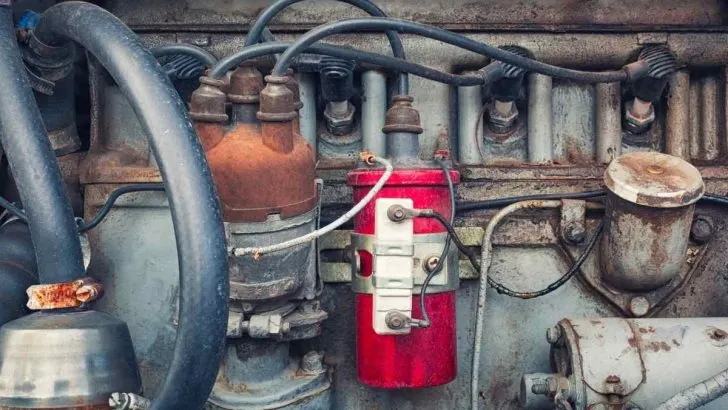Arguably, the quality of diesel engines has increased dramatically over the past few years. Today’s diesel engines are much more dependable than ever before. However, many things can ruin them, mainly caused by neglect or human error.
Here are 9 surprising things that’ll ruin a diesel engine:
- Water in the diesel fuel.
- Using out-of-spec fuel.
- Using old lube oil.
- Installing inferior aftermarket parts.
- Excessive idling.
- Lack of maintenance.
- Using a dirty air filter.
- Using old fuel.
- Using gasoline in a diesel engine.
Read on for more insights into how these things damage diesel engines and tips on avoiding these problems.
1. Water in the Diesel Fuel
Water in diesel is the most common cause of injector failure. The water comes from condensation due to temperature swings, poorly sealed filler caps, or the tank vent being submerged in water after driving through a stream, to mention but a few (source).
Water in a diesel engine can cause several problems, including:
- The diesel engine may stop or fail to start.
- Corrosion starts to take place, rapidly damaging the injectors.
- Water seeps into the engine’s electrical components, causing them to malfunction.
- The red rust-prevention fluid in the injection lines clogs up the fuel filters.
- Fuel becomes gelatinous, forming a thick sludge.
- Condensation can corrode metal parts, damaging the high-pressure pump.
Pro Tip: To eliminate water from the fuel system, add a water separator.
Here’s a great tutorial on how to install a fuel water separator on your car:
Also, if you’re going to store diesel for a long time, be sure to use a biocide or water-repellent additive at every refill. Pour some into the tank before starting your engine if you haven’t run it for a while.
2. Using Out-of-Spec Fuel
Fuel that isn’t up to standards can cause significant problems in the engine. For example, corrosion and piston damage will occur if you use diesel that contains too much sulfur or water.
If there isn’t enough lubricity (slickness) in the fuel due to a low cetane index, you’ll end up damaging the cylinders and pistons after about 5,000 miles (8,046.72 km) (source).
If you use unleaded diesel (which is the case with biodiesel) or if it contains ethanol, injectors and fuel lines can get clogged up.
Tip: To prevent these problems, make sure the fuel complies with ASTM D975. If you’re buying fuel from a bulk supplier, make sure a gasoline association authorizes them.
3. Using Old Lube Oil
Lube oil over a year old can damage the fuel injection pump due to the high pressure it’s exposed to. Besides, oil that has been in a diesel engine for too long turns into sludge, which can clog up valves and oil galleries (source).
Additionally, if the oil has been exposed to too many temperature fluctuations, it can cause problems in the fuel injection system.
On another note, if your engine contains a mechanical high-pressure oil pump (as opposed to an electronic one) and you don’t change the lube oil every two years or 30,000 miles or 48,280.32 km (whichever comes first), then you’ll damage the engine’s camshaft bearings, shafts, and oil pump.
Pro Tip: To prevent lube oil from turning into sludge over time, use diesel-compatible 10W-40 or 15W-40 motor oil with an API service classification of CI-4/SL or better. If you’re running on biodiesel, it’s best to use a product designed for biodiesel (source).
4. Using Inferior Aftermarket Parts
Many aftermarket parts can increase your engine’s performance, but if they’re of inferior quality, they may damage your engine.
Examples of low-quality aftermarket parts include glow plugs, air filters, high-pressure fuel pumps, injection nozzles, and valves.
For example, if you have a faulty glow plug in your diesel engine, it’ll break down quickly due to the high pressures involved within the combustion chamber.
Pro Tip: Before you buy any aftermarket part, do some research and make sure a reputable manufacturer makes it. Also, stick with parts that meet or exceed OEM standards to be on the safe side.
5. Excessive Idling
According to the United States Environmental Protection Agency, engine idling comes with several negative consequences, ranging from fuel waste to pollution and engine wear (source).
If your engine is a four-cycle diesel, you need to let it warm up before driving. Doing so ensures that all the engine parts are moving, making starting the vehicle a lot easier.
Moreover, warming up your diesel before starting it helps dissolve any condensation that might have formed in its fuel lines. If there’s too much water in there, you risk damaging your injectors or filter due to excess pressure.
To avoid breaking down your diesel engine, only idle it for at most three minutes. Also, avoid idling at stop lights or waiting in line at the drive-thru to prevent excessive pressure buildup.
6. Lack of Maintenance
If you don’t change oil and lube oil frequently enough, or you don’t take care of your vehicle’s maintenance needs (such as checking the coolant level, tire pressure, and so on), you’ll severely damage your diesel engine.
Pro Tip: To prevent problems, follow your car’s service schedule. If you don’t know what it is, consult your owner’s manual or visit a mechanic to find out. Also, use high-quality parts that meet or exceed OEM standards.
7. Using a Dirty Air Filter
According to McNally Institute, a dirty air filter can severely hurt your engine.
It reduces engine power and efficiency while increasing emissions, resulting in poor fuel economy and more frequent repairs (which typically cost more than regular maintenance). A dirty air filter can even damage your diesel by causing it to overheat.
Tip: To prevent problems with your engine, regularly change the air filter. Your service schedule should tell you when to do so, but in general, most recommend changing it every 15,000 miles (24,140.16) or annually. If you drive in dusty conditions frequently, replace it more often.
8. Using Old Fuel
If you don’t use a fuel stabilizer additive in stored fuel or let the fuel level go low without refueling, you increase the risk of damaging your injectors. Neglecting to refresh your fuel tank can also affect other components in the injection system due to water contamination (which isn’t healthy for any engine).
Pro Tip: To keep your fuel fresh and clean until you’re ready to use it, add a fuel stabilizer additive before storing your diesel. In this case, I recommend this STA-BIL Fuel Stabilizer (link to Amazon). It can keep diesel fresh for up to 12 months, and it also cleans and lubricates your vehicle’s fuel system.
9. Using Gasoline in a Diesel Engine
Putting gasoline in a diesel engine poses the risk of damaging your engine.
Notably, gas lacks the lubricating properties of diesel and may cause the engine to smoke profusely and wear out more quickly than usual. Doing so can even damage the engine’s piston rings and its compression rings.
Pro Tip: To prevent this problem, make sure you fuel up with diesel when you have a diesel engine. Also, consider using a diesel-compatible fuel additive to clean the injectors and remove water from your gas tank if you store your diesel for a long time.
Recommended Reading:

